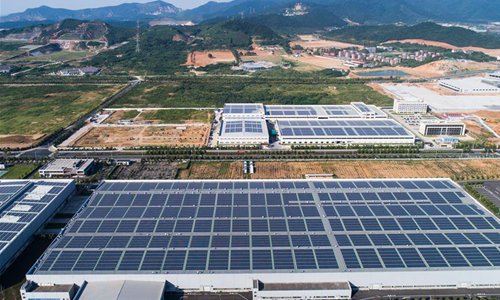HOME >> BUSINESS
China eyes global energy ties to ensure supplies
Source:Global Times Published: 2019/9/26 19:28:40
Development of oil sector among highlights over past 70 years

Aerial photo taken on Sept. 19, 2019 shows solar panels on the rooftop of a local automobile maker in Huzhou, east China's Zhejiang Province. New energy sources including distributed photovoltaic systems and wind farms have taken increased shares in the power supply of Huzhou since the city adopted a low-carbon development plan. (Xinhua/Xu Yu)
Energy development has been a highlight of China's achievements over the past 70 years. Starting from low production levels and serious structural problems, the country has grown into a major global energy power that is striving to promote international cooperation and provide its own energy solutions to ensure a stable international energy supply.
One recent effort was China's proposal to set up an "energy interconnection," made during an energy conference held in Cebu City in the central Philippines, in a bid to ensure steady power supply in Asia, the Xinhua News Agency reported on Monday.
China's global energy strategy is also reflected in its close cooperation with international energy organizations over the past decades, such as the Energy Charter, the International Energy Agency, and the International Renewable Energy Agency.
It has been also advocating the establishment of the Belt and Road Initiative (BRI) energy partnership, promoting the establishment of the Shanghai Cooperation Organization Energy Club, and successfully hosting the Sino-Russian Energy Business Forum, as well as G20 international activities such as the Energy Ministers' meeting, and the APEC Energy Ministers' meeting.
Lin Boqiang, director of the China Center for Energy Economics Research at Xiamen University, told the Global Times on Thursday that China's energy global cooperation is a result of the country's improving energy capability, including its cutting-edge and world-class abilities in wind electricity, photovoltaic power and oil exploration, according to Lin.
From 1976 to 2002, the country's world-famous Daqing Oil field maintained a stable and high production of more than 50 million tons of crude oil a year, a miracle in the history of the development of similar oil fields around the world, proving its solid oil extraction ability.
As of the first half of 2019, the field had produced 2.39 billion tons of oil, accounting for 40 percent China's onshore crude oil output in the same period.
"These abilities are also the base that enables China to promote energy cooperation around the world, especially involving the Belt and Road Initiative," Lin said.
China National Petroleum Corp, the country's major national oil and gas corporation, is managing 93 overseas oil and gas cooperation projects in 35 countries and regions, and it has international businesses in more than 80 countries and regions. Fifty projects are in 19 countries involved in the BRI, according to a statement seen by the Global Times.
Many countries involved in the BRI have rich oil and natural gas resources and have great demand for exploration, pipeline construction and refining and chemical technology. But most of them also have problems including shortages of funds, gaps in technology and lack of exploration equipment, and that is where China could see opportunities and help them, experts said.
According to Lin, China's pursuit for global cooperation is also a result of the country's growing domestic energy demand amid its rapid economic development.
In 1953, China's total energy consumption was only 500 million tons of standard coal. In 2018, it reached 4.64 billion tons, at an average annual growth rate of 7.1 percent, according to data from the National Bureau of Statistics (NBS).
Energy consumption per capita has also significantly risen. In 1953, China's per capita energy consumption was only 93 kg of standard coal. In 2018, it reached 3,332 kg, with an average annual growth rate of 5.7 percent, NBS data showed.
Rising demand has pushed China to diversify its energy import sources, Lin said, and this is a necessary long-term effort.
Posted in: INDUSTRIES,ECONOMY